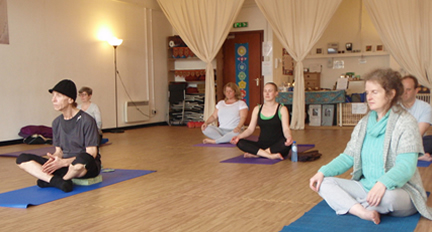
Last week I watched my husband limping with back and leg pain after spending hours sanding our floors. Clearly, bending over with the sander was aggravating a pre-existing back injury. Rather than avoiding the activity creating his pain, he worked, bent over with the sander, a good part of the next day. Our floors looked great once he finished. But it took several days for the physical pain this work caused to diminish.
The suffering of day one did not make him avoid what had caused that suffering on day two. But, we all do things like that. We continue saying “yes” to projects even though we know our days are full. Somewhere in the back of the mind is a voice reminding us stress and fatigue will result, but we still add just one more thing to an already full calendar.
Patanjali,s Yoga Sutras say there are three kinds of suffering. Suffering due to change, suffering that comes from things we long for or are greatly attached to, and suffering that comes from not being able to override our patterns even when
they are harming us. Here are some examples I notice in everyday life.
Parinama – Change is constant. The seasons change from hot to warm to chilly to cold. We change as we grow from children to householders to “seniors.” Our closest friend moves across the country. A family member gets sick and dies. A beloved pet is lost. Our business grows, and then closes. Yesterday was sunny, today is cloudy. Everything changes but we may not recognize it if the transition is slow. But sometimes the change is so quick that we cannot comprehend it, let alone adjust to it. We want to hang on to what is familiar, but as the reality doesn’t allow
that, we grieve and suffer.
Tapa – Wanting what we want and keeping what gives us pleasure. Dreams of something we want to own or achieve can be pleasurable or painful. When the desire for a house, a relationship, or recognition is strong yet not achievable, we can feel frustrated, angry, sad, miserable. In another example, we may love our job and identify so strongly with our occupation that when we retire we mourn the loss of who we were rather than living a new life. In either case, desiring something we cannot have or being attached to something that changes or disappears, we
experience pain.
Samskara – Deep conditioning or imprint, habit. Have you ever seen someone with an oxygen tank who can’t resist lighting a cigarette, or someone who has had a triple by-pass salivating over a Big Mac and French fries? Certain unconscious patterns of behavior cultivated over a long period of time may result in
problems, ill-health, and suffering.
Our experiences create impressions in our mind. The more the experience is repeated or the more profound, the deeper the impression. We may not be aware that these engrained ways of seeing ourselves or the world cause us to think and act a certain way. Even with the knowledge of what will cause our suffering, the patterns are so deeply rooted that we often fail in our attempts to reduce that very suffering.
Avoid future suffering
Our goal, then, is to be able to discriminate between what is real and what is the mind’s tendency to vacillate, create desires, and identify with things that have the potential to create suffering. So, how, we might ask, shall we do this?
Prepare for the negative aspects of suffering. If there is a hurricane coming, you prepare for it. Those who ignore warnings suffer the most, unfortunately. Often our desire to do something, whether it is to sand floors or to stay in our home during a storm, overrides our awareness that we are creating more potential for suffering.
Here is where yoga practice can help. We learn as we move, breathe and meditate, where the lines are between feeling comfort and discomfort. We grow in awareness, not only of our bodies, but of our thoughts and patterns as well. With greater consciousness, our ability to discern between what is helpful and what will cause suffering grows.
We can’t control everything, especially not Nature. But, with mindfulness we can make better choices to prepare for or avoid the effects of suffering. The floors may have to be sanded, but we can hire someone. And, we can’t control Mother Nature but we can board up the house and get the kids and dog in the car and leave.
